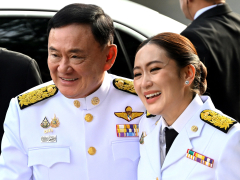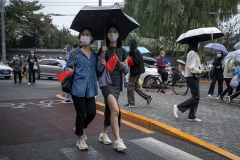Bangkok, Thailand – Thailand’s Constitutional Court is set to decide whether to remove suspended Prime Minister Paetongtarn Shinawatra from office over a controversial phone call with Cambodia’s former leader, in a ruling that could deal a further blow to the embattled Shinawatra dynasty and plunge the Southeast Asian kingdom into fresh political turmoil.
An unfavourable verdict for Paetongtarn on Friday would make her the fifth prime minister since 2008 to be stripped of office by Thailand’s judges, who critics say defend the interests of the country’s royalist-military establishment.
The move could also potentially pave the way for early elections.
Friday’s ruling is also the second in three high-stakes court cases against Paetongtarn, 39, and her father, former Prime Minister Thaksin Shinawatra.
The 76-year-old billionaire, who is a hero to the country’s rural poor and who was ousted in a military coup in 2006, dodged a jail sentence last week when he was acquitted of insulting the country’s powerful monarchy.
But he still faces another case relating to his return to Thailand in 2023, after 16 years in self-imposed exile, which could land him back in prison.
Even if Paetongtarn survives, analysts said the saga, as well as the failure of her Pheu Thai party-led coalition to deliver on key economic pledges, has left the Shinawatra brand in peril.
“I think that the Shinawatra brand is done for,” said Napon Jatusripitak, visiting fellow and acting coordinator of the Thailand Studies Programme at the ISEAS-Yusof Ishak Institute.
“Pheu Thai depends very much on the Shinawatra legacy. … Even the charismatic leadership that Thaksin is often associated with has been chipped away by Paetongtarn’s naivete that has been put on public spectacle on a global scale,” he said, referring to her leaked conversation with former Cambodian Prime Minister Hun Sen.
‘A political case’
During the call, which took place after deadly border clashes between Thai and Cambodian forces in May, Paetongtarn was heard kowtowing to Hun Sen, a longtime friend of her father’s, and calling him “uncle” while criticising a senior Thai army commander and describing him as an “opponent”.
The comments caused a public outcry in Thailand, with some Thais accusing her of treason.
Paetongtarn apologised for her remarks, but the Constitutional Court took up a petition that accused her of ethical misconduct and suspended her pending a review of the case.
“Judicial intervention has long shaped Thailand’s politics,” said Khemthong Tonsakulrungruang, constitutional law scholar at Chulalongkorn University, noting how the courts had also intervened to topple Thaksin-aligned prime ministers in 2008 and to bar his sister, Yingluck, from office after a coup in 2014.
“Whether [Paetongtarn] survives the court’s judgement or not, the outcome will not hinge on legal arguments but on political instructions,” Khemthong said. “This has never been a matter of law. It is, and always has been, a political case.”
It does not help Paetongtarn that the clashes – which ended in a Malaysia-brokered ceasefire after dozens were killed on both sides of the border – have also taken place at a time when Pheu Thai’s popularity has been plummeting.
In its rocky two years in government, the party has been unable to reset the economy or drive through key policies, including raising the minimum wage, legalising casinos and completing a much-t





